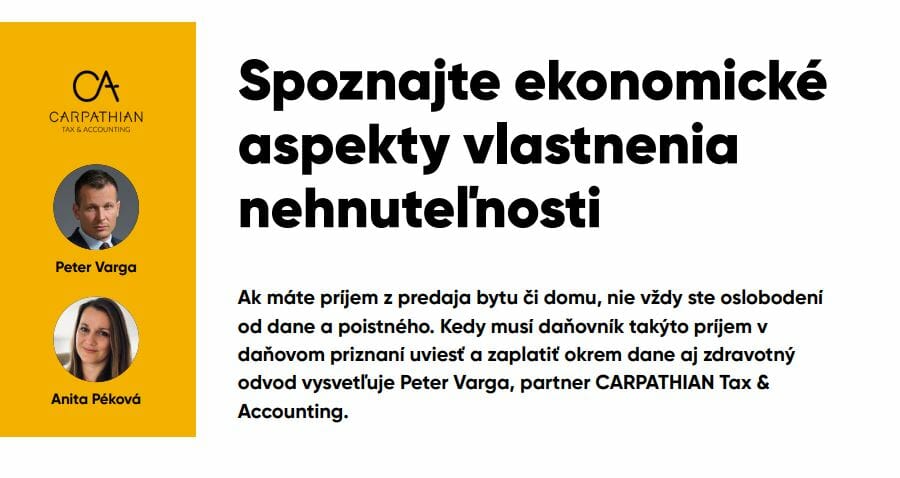
If you have income from the sale of your flat or house, you are not always exempt from tax and insurance premiums. Peter Varga and Anita Péková explained when the taxpayer must include such income in the tax return and pay the health levy in addition to the tax in an interview for Hospodárske noviny. The full interview can be found by clicking on the Hospodárske noviny page or in visual form below
When is it worthwhile for an entrepreneur to buy an apartment for a company and when is it better to buy it for a person?
Answering this question requires knowledge not only of income tax, levies and value added tax, but there is also some legal context. It is also necessary to be able to estimate the economic aspects of owning a property – the cost of renting, the growth or decline of property or construction inputs, which have a significant impact on answering this question. From the point of view of income tax and levies, it is in principle worthwhile to make a purchase with the intention of owning the property for more than five years as a natural person. This is because the sale of real estate after five years of acquisition by an individual, if the real estate was not in commercial property, is not taxable. Thus, she does not even have a taxable basis for health insurance premiums.
However, this obviously does not always and everywhere have to be the case. What might be the impact of a rise in property prices?
If property prices were not rising at the rate we have been used to in recent years, and the property required some investment for repairs or upgrades, it might be more efficient in a particular case to own the property as a corporate entity. Let’s illustrate this with the example of an individual who buys a property for 200 thousand euros and rents it out with a profit of seven thousand euros per year after deducting OPEX. After five years, he decides to sell the property. Before the sale, however, it will carry out reconstruction in the amount of 30 thousand euros and sell the property for 225 thousand euros. The total tax liability – we assume that the property is rented out in a so-called passive form – is higher for those five years than the tax liability of a legal entity on the sale of the property would be, when the tax base on the sale would be the difference between the sale price, i.e. 225 thousand euros, and the tax-residual price of the property, i.e. 175 thousand euros.
Are there more complex cases in practice?
For example, renting out a property as a sole trader also brings some complexity. In some cases, this type of renting is more tax-efficient than so-called passive renting, and the above example could lead to the opposite answer. It depends on the total amount of income and also on the other sources of such an individual. Further, individuals may put the property into a business property and thus claim depreciation, repair, renovation, tax or insurance charges against the rental income.
What role can the possibility of deducting value added tax play in the decision?
If certain conditions are met, the buyer of the property can deduct the value added tax and the state will pay the “excess deduction”. If a property in a new building costs, for example, 250 thousand euros with value added tax, the buyer will get 41 667 euros back from the state. But, of course, this is not so simple. Generally, it is necessary that such a purchaser subsequently makes taxable transactions in the property for value added tax purposes. Otherwise, the right to deduct value added tax is lost. In practice, there are also various hybrid situations where, for example, the buyer receives an excessive deduction from the state, but has to repay only part of it after a certain period of time. There are several tax variations. In general, however, it can be stated that the right to deduct value added tax does not automatically imply an advantageous tax position for the buyer.
To what extent should the legal dimension also be considered?
When buying a property as a legal entity, the buyer’s legal position is not as protected. On the other hand, buying real estate in the name of a legal person is more sensible, especially in situations where there is a risk of security or forfeiture of all or part of the property or assets associated with the natural person. Anyway. The topic is very complex and it is not possible to give a blanket answer to this question. In practice, this always needs to be assessed on an individual basis.

If you are interested in this topic, please do not hesitate to contact us.
Law & Tax
Tomas Demo
tomas.demo@highgate.sk
Accounting
Peter Šopinec
peter.sopinec@highgate.sk
Crypto
Peter Varga
peter.varga@highgate.sk